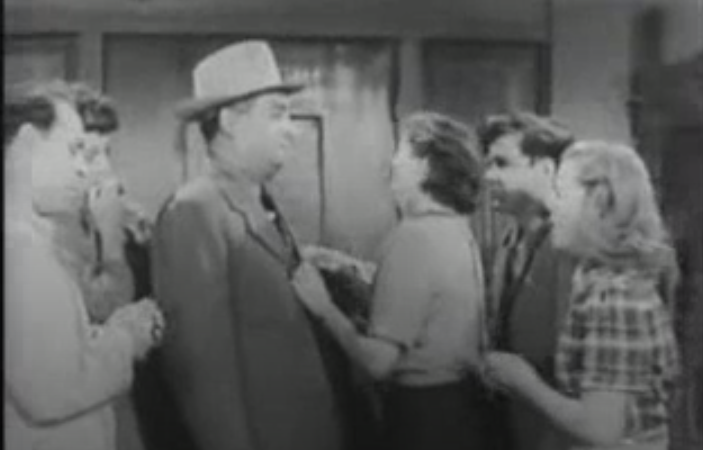What I watched: The twenty-second episode of The Life of Riley, an early sitcom. The episode starred Jackie Gleason, Rosemary DeCamp, Gloria Winters, Sid Tomack, Lanny Rees and Maxine Semon. It was directed by Herbert I. Leeds, and written by Irving Breecher, Reuben Shipp, and Alan Lipscott. “South American Job” aired on NBC at 9:30 PM on Tuesday, February 28, 1950, and is available to watch on the Internet Archive.
What happened: Riley comes home, and is obviously despondent, leading to the rest of his family to start waiting on him. He regrets not taking a job from Peg’s father when he married into the family. It turns out that Gillis has been made his foreman, which Riley sees as the ultimate insult. Honestly, I don’t blame him.

Gillis and his wife come in dressed to the nines to lord it over his new subordinate. Honeybee also rubs her new fur coat in Peg’s face. Riley decides that he’s going to confront his boss tomorrow and ask for a promotion. Surprisingly, this works, although we don’t actually see the conversation. Riley tells his family that he’s getting a job supervising the paving of a new plant outside San Diego, and that the family will have to move for six months.
Riley then promptly decides to turn around and lord his superior salary ($140 a week!) over Gillis. But Gillis puts two and two together and figures out that the plant is actually outside of Santiago, Chile. Riley promptly freaks out, but decides that he has to go since he’s given his word. His family begs him to stay, saying that they don’t care about the money.
We cut to the office, where his boss Stevenson is berating him for trying to back out. Riley says that he’s afraid of the jungle, with all the snakes and headhunters. (His boss at least corrects him.) Back home, Peg decides that they should let Riley go and seize the opportunity. The kids gradually agree to the idea. So when Riley and his boss turn up, he’s disappointed to see that his family have all had a change of heart.
Later, Riley is getting ready to leave while Babs tries to teach him Spanish. He and Peg both realize that they assumed the other one wanted him to go. He still tries to go, but at the visa office his mixed-up Spanish leads him to say “down with Chile,” Riley says a tearful goodbye at the door, but it turns out that his malapropism cost him his visa and the job. And so Riley is resigned to a life of stagnant wages. What a happy ending!
What I thought: Here we see yet another sitcom staple that was already fully developed by 1950: the episode where a central character threatens to move away but doesn’t. These episodes pose an unconvincing threat to the familial unit at the core of the show. We know, of course, that Uncle Jesse isn’t really going to take the job as a roadie and be out of the show, but I suppose the pleasure — if there is any — is in seeing how the characters react to the threat, and how the writers get out of it.

Of course, in real life many people — perhaps most people — take the job. My mother, my sister and myself have all spent extended time away from home for jobs, often with less promise of advancement than Riley receives here. From my perspective, it seems an outright bad idea for a man whose children are mostly grown to not be willing to spend six months abroad to double his salary.
But this is precisely the fantasy of the sitcom: that the family unit will always remain in tact and primary, that money can be a problem but never the problem. After this episode, of course, the whole South American proposal will be forgotten and Gillis will go back to being Riley’s equal and we’ll never see Riley and Peg in their sixties unable to retire or pay the mortgage because he ruined his chances of advancement. The sitcom promises viewers an escape from the messy and compromised families in their own lives.
The question of where the other place is seems also relevant here. South America was an object of popular interest throughout the 1940s, particularly in World War II when “hemispheric solidarity” was thought of as essential to the war effort. (Probably the most interesting part of this craze was Orson Welles’ uncompleted film It’s All True.) South America represented a liminal place, wealthy enough to be a destination for corporate projects but poor enough to be exotic and scary to someone like Riley.
In the end, the episode doesn’t do much with these associations. Ultimately, the whole problem is resolved with a sitcom mix-up, a rather convenient way for them to resolve the problem without any of the characters actually doing anything. Life of Riley has always been a show run on the cheap, but these last few episodes seem to be especially threadbare, with few guest stars or sets outside the home and lots of long conversations between Riley and his family. In comparison to their homebody protagonist, the show’s creators just seem desperate to get to the end and then get out. And, to be honest, I’m feeling the same way.
Coming up next: We close out February 1950 with another spooky episode of Suspense.
